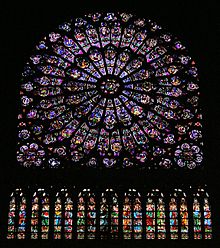Antoine de Saint Exupéry

Antoine de Saint Exupéry (29 June 1900 – 31 July 1944) was a French writer, poet and aviator.
- See also The Little Prince
Quotes
[edit]
- Even our misfortunes are a part of our belongings
- Vol de Nuit (1931) (translated into English as Night Flight)
- Les pierres du chantier ne sont en vrac qu’en apparence, s’il est, perdu dans le chantier, un homme, serait-il seul, qui pense cathédrale.
- Translation: A rock pile ceases to be a rock pile the moment a single man contemplates it, bearing within him the image of a cathedral.
- Pilote de Guerre (1942) (translated into English as Flight to Arras)
- Toute nation est égoïste. Toute nation considère son égoïsme comme sacré.
- Translation: Every nation is selfish and every nation considers its selfishness sacred.
- "Letter to an American" (1944)
- If it is true that wars are won by believers, it is also true that peace treaties are sometimes signed by businessmen.
- "Letter to an American" (1944)
Terre des Hommes (1939)
[edit]
- Unless otherwise noted, as translated into English as Wind, Sand and Stars (1939) by Lewis Galantière



- "Navigating by the compass in a sea of clouds over Spain is all very well, it is very dashing, but—"
And I was struck by the graphic image:
"But you want to remember that below the sea of clouds lies eternity."
And suddenly that tranquil cloud-world, that world so harmless and simple that one sees below on rising out of the clouds, took on in my eyes a new quality. That peaceful world became a pitfall. I imagined the immense white pitfall spread beneath me. Below it reigned not what one might think — not the agitation of men, not the living tumult and bustle of cities, but a silence even more absolute than in the clouds, a peace even more final. This viscous whiteness became in my mind the frontier between the real and the unreal, between the known and the unknowable. Already I was beginning to realize that a spectacle has no meaning except it be seen through the glass of a culture, a civilization, a craft. Mountaineers too know the sea of clouds, yet it does not seem to them the fabulous curtain it is to me.- Ch. I : The Craft
- I had a vision of the face of destiny.
Old bureaucrat, my comrade, it is not you who are to blame. No one ever helped you to escape. You, like a termite, built your peace by blocking up with cement every chink and cranny through which the light might pierce. You rolled yourself up into a ball in your genteel security, in routine, in the stifling conventions of provincial life, raising a modest rampart against the winds and the tides and the stars. You have chosen not to be perturbed by great problems, having trouble enough to forget your own fate as man. You are not the dweller upon an errant planet and do not ask yourself questions to which there are no answers. You are a petty bourgeois of Toulouse. Nobody grasped you by the shoulder while there was still time. Now the clay of which you were shaped has dried and hardened, and naught in you will ever awaken the sleeping musician, the poet, the astronomer that possibly inhabited you in the beginning.
The squall has ceased to be a cause of my complaint. The magic of the craft has opened for me a world in which I shall confront, within two hours, the black dragons and the crowned crests of a coma of blue lightnings, and when night has fallen I, delivered, shall read my course in the stars.- Ch. I : The Craft
- Each man must look to himself to teach him the meaning of life. It is not something discovered: it is something molded. These prison walls that this age of trade has built up round us, we can break down. We can still run free, call to our comrades, and marvel to hear once more, in response to our call, the impassioned chant of the human voice.
- Ch. II : The Men, as quoted in The Lyric Self in Zen and E.E. Cummings (2015) by Michael Buland Burns and Rima Snyder, p. 72
- 1939 translation:
- We can still run free, call to our comrades, and marvel to hear once more, in response to our call, the pathetic chant of the human voice.
- Être homme, c'est précisément être responsable. C'est connaître la honte en face d'une misère qui ne semblait pas dépendre de soi. C'est être fier d'une victoire que les camarades ont remportée. C'est sentir, en posant sa pierre, que l'on contribue à bâtir le monde.
- To be a man is, precisely, to be responsible. It is to feel shame at the sight of what seems to be unmerited misery. It is to take pride in a victory won by one's comrades. It is to feel, when setting one's stone, that one is contributing to the building of the world.
There is a tendency to class such men with toreadors and gamblers. People extol their contempt for death. But I would not give a fig for anybody's contempt for death. If its roots are not sunk deep in an acceptance of responsibility, this contempt for death is the sign either of an impoverished soul or of youthful extravagance.- Ch. II : The Men
- Variant translation: To be a man is to be responsible: to be ashamed of miseries you did not cause; to be proud of your comrades' victories; to be aware, when setting one stone, that you are building a world.
- To be a man is, precisely, to be responsible. It is to feel shame at the sight of what seems to be unmerited misery. It is to take pride in a victory won by one's comrades. It is to feel, when setting one's stone, that one is contributing to the building of the world.
- Have you looked at a modern airplane? Have you followed from year to year the evolution of its lines? Have you ever thought, not only about the airplane but about whatever man builds, that all of man's industrial efforts, all his computations and calculations, all the nights spent over working draughts and blueprints, invariably culminate in the production of a thing whose sole and guiding principle is the ultimate principle of simplicity?
It is as if there were a natural law which ordained that to achieve this end, to refine the curve of a piece of furniture, or a ship's keel, or the fuselage of an airplane, until gradually it partakes of the elementary purity of the curve of a human breast or shoulder, there must be the experimentation of several generations of craftsmen. In anything at all, perfection is finally attained not when there is no longer anything to add, but when there is no longer anything to take away, when a body has been stripped down to its nakedness.- Ch III : The Tool
- Variant translation of: Il semble que la perfection soit atteinte non quand il n'y a plus rien à ajouter, mais quand il n'y a plus rien à retrancher.
- Ch. III: L'Avion
- It seems that perfection is attained not when there is nothing more to add, but when there is nothing more to remove.
- Precisely because it is perfect the machine dissembles its own existence instead of forcing itself upon our notice.
And thus, also, the realities of nature resume their pride of place. It is not with metal that the pilot is in contact. Contrary to the vulgar illusion, it is thanks to the metal, and by virtue of it, that the pilot rediscovers nature. As I have already said, the machine does not isolate man from the great problems of nature but plunges him more deeply into them.
Numerous, nevertheless, are the moralists who have attacked the machine as the source of all the ills we bear, who, creating a fictitious dichotomy, have denounced the mechanical civilization as the enemy of the spiritual civilization.
If what they think were really so, then indeed we should have to despair of man, for it would be futile to struggle against this new advancing chaos. The machine is certainly as irresistible in its advance as those virgin forests that encroach upon equatorial domains.- Ch III : The Tool
- Transport of the mails, transport of the human voice, transport of flickering pictures — in this century, as in others, our highest accomplishments still have the single aim of bringing men together. Do our dreamers hold that the invention of writing, of printing, of the sailing ship, degraded the human spirit?
It seems to me that those who complain of man's progress confuse ends with means. True, that man who struggles in the unique hope of material gain will harvest nothing worth while. But how can anyone conceive that the machine is an end? It is a tool. As much a tool as is the plough. The microscope is a tool. What disservice do we do the life of the spirit when we analyze the universe through a tool created by the science of optics, or seek to bring together those who love one another and are parted in space?- Ch III : The Tool
- "I swear that what I went through, no animal would have gone through." This sentence, the noblest ever spoken, this sentence that defines man's place in the universe, that honors him, that re-establishes the true hierarchy, floated back into my thoughts.
- Ch III : The Tool
- Human drama does not show itself on the surface of life. It is not played out in the visible world, but in the hearts of men. … One man in misery can disrupt the peace of a city. It is another of the miraculous things about mankind that there is no pain nor passion that does not radiate to the ends of the earth. Let a man in a garret but burn with enough intensity and he will set fire to the world.
- Ch. IX Barcelona and Madrid (1936)
- No man can draw a free breath who does not share with other men a common and disinterested ideal. Life has taught us that love does not consist in gazing at each other but in looking outward together in the same direction. There is no comradeship except through union in the same high effort. Even in our age of material well-being this must be so, else how should we explain the happiness we feel in sharing our last crust with others in the desert? No sociologist's textbook can prevail against this fact. Every pilot who has flown to the rescue of a comrade in distress knows that all joys are vain in comparison with this one. And this, it may be, is the reason why the world today is tumbling about our ears. It is precisely because this sort of fulfilment is promised each of us by his religion, that men are inflamed today. All of us, in words that contradict each other, express at bottom the same exalted impulse. What sets us against one another is not our aims — they all come to the same thing — but our methods, which are the fruit of our varied reasoning.
Let us, then, refrain from astonishment at what men do. One man finds that his essential manhood comes alive at the sight of self-sacrifice, cooperative effort, a rigorous vision of justice, manifested in an anarchist's cellar in Barcelona. For that man there will henceforth be but one truth — the truth of the anarchists. Another, having once mounted guard over a flock of terrified little nuns kneeling in a Spanish nunnery, will thereafter know a different truth — that it is sweet to die for the Church. If, when Mermoz plunged into the Chilean Andes with victory in his heart, you had protested to him that no merchant's letter could possibly be worth risking one's life for, Mermoz would have laughed in your face. Truth is the man that was born in Mermoz when he slipped through the Andean passes.- Ch. IX Barcelona and Madrid (1936)

Le Petit Prince (1943)
[edit]- These are just a few selections, for more quotes from this work see The Little Prince.
- Voici mon secret. Il est très simple: on ne voit bien qu'avec le cœur. L'essentiel est invisible pour les yeux.
- Here is my secret. It is very simple. It is only with the heart that one can see rightly; What is essential is invisible to the eye.
- Variant translations: Here is my secret. It is very simple: one sees well only with the heart. The essential is invisible to the eyes.
The essential things in life are seen not with the eyes, but with the heart.
- Les grandes personnes ne comprennent jamais rien toutes seules, et c'est fatigant, pour les enfants, de toujours leur donner des explications.
- Grown-ups never understand anything by themselves, and it is tiresome for children to be always and forever explaining things to them.
- Ce qui embellit le désert, dit le petit prince, c'est qu'il cache un puits quelque part...
- "What makes the desert beautiful", said the little prince, "is that it hides, somewhere, a well".
Citadelle or The Wisdom of the Sands (1948)
[edit]- L'avenir, tu n'as point à le prévoir mais à le permettre.
- Your task is not to foresee the future, but to enable it.
- Ne confonds point l’amour avec le délire de la possession, lequel apporte les pires souffrances. Car au contraire de l’opinion commune, l’amour ne fait point souffrir. Mais l’instinct de propriété fait souffrir, qui est le contraire de l’amour.
- Confuse not love with the ravings of possession, which bring the worst sufferings. For contrary to the general opinion, love does not cause suffering. But the instinct of ownership causes suffering, which is the contrary of love.
- p. 152
- Confuse not love with the ravings of possession, which bring the worst sufferings. For contrary to the general opinion, love does not cause suffering. But the instinct of ownership causes suffering, which is the contrary of love.
- [...] Car une civilisation repose sur ce qui est exigé des hommes, non sur ce qui leur est fourni.
- A civilization is built on what is required of men, not on that which is provided for them.
Disputed
[edit]- A goal without a plan is just a wish.
The earliest appearance yet located of this statement is in 50 Ways to Lose Ten Pounds (1995) by Joan Horbiak, p. 95, where it is quoted as an anonymous proverb. It seems to have circulated as such for a few years before it began to be attributed to Saint Exupéry around 2007.
- If you wish to build a ship, do not divide the men into teams and send them to the forest to cut wood. Instead, teach them to long for the vast and endless sea.
- If you want to build a ship, don’t drum up people together to collect wood and don’t assign them tasks and work, but rather teach them to long for the endless immensity of the sea.
- If you want to build a ship, don’t drum up the men and women to gather wood, divide the work, and give orders. Instead, teach them to yearn for the vast and endless sea.
These appear to be loose paraphrases of this passage from Saint-Exupéry's Citadelle (1948):
One will weave the canvas; another will fell a tree by the light of his ax. Yet another will forge nails, and there will be others who observe the stars to learn how to navigate. And yet all will be as one. Building a boat isn’t about weaving canvas, forging nails, or reading the sky. It’s about giving a shared taste for the sea, by the light of which you will see nothing contradictory but rather a community of love.[1]
See also
[edit]External links
[edit]- ↑ "Teach Them to Yearn for the Vast and Endless Sea," Quote Investigator August 25, 2015


